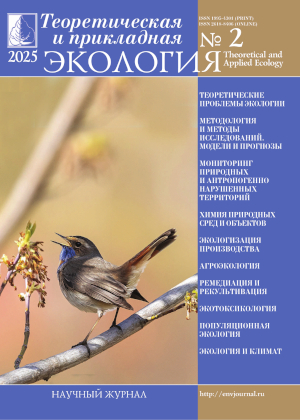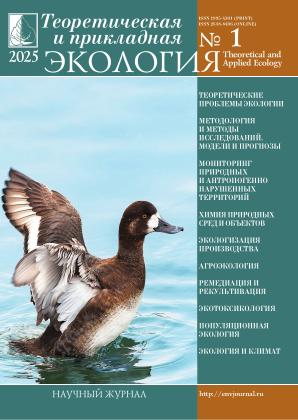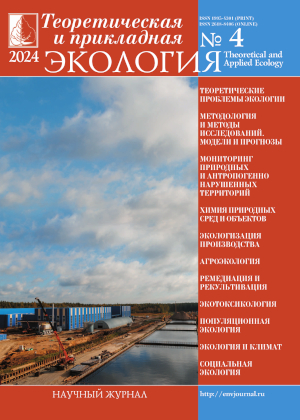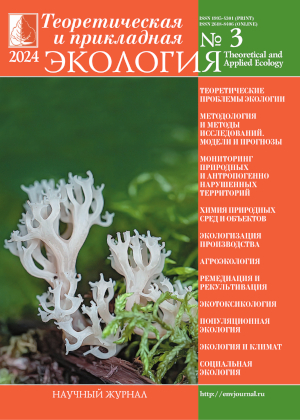|
|
|
|
Influence of microbiological preparations on yield of spring soft wheat |
|
|
I.U. Ivanova, D.A. Dementiev |
|
|
Section: Agroecology
|
|
|
Thousands of tons of chemical products are used annually in the world industrial production of agricultural products, both mineral fertilizers and toxic chemicals, aimed at combating diseases, pests and weeds. These chemicals actively influence not only the object of the struggle, but also the soil flora and fauna. The inhabitants of the soil, which loosen the soil, as well as the microorganisms involved in the processes of humification and mineralization of humus, are dying. The vacant ecological niches are occupied by organisms pathogenic for plants. This leads to the need to apply disinfectants and fungicides in even larger quantities.
One way to break this destructive chain is to replace chemical fungicidal drugs with microbiological ones. In these preparations, microorganisms are natural competitors of phytopathogens, which have an antibiotic effect, protecting the cultivated crop from diseases. In addition, these microorganisms are able to assimilate free nitrogen of the air, supplying them with plants and soil, transfer inaccessible phosphorus compounds to plants that are readily available for plants, produce growth stimulants and other biologically active substances that positively affect the growth, development and productivity of the crop. Also, the soil is saturated with microflora useful for the soil and plants.
On the experimental base of the Chuvash Research Institute of Agriculture, the effect of microbiological preparations on biometrics, yield and economic efficiency of cultivation of spring soft wheat varieties Moskovskaya 35 was investigated. The greatest increase in yield on average for 2 years was given by the joint use of preparations based on nitrogen-fixing and phosphate-mobilizing microorganisms - up to 1.5 t / ha. At the same time, the cost of bio-fertilizers amounted to 1.9-5.4% of the total cost structure. The profitability of cultivation increased from 14.4% with the use of only one strain of microorganisms, up to 43.5% with the use of 2 types of microbiological fertilizers, in comparison with the control. |
|
|
Keywords: microbiological fertilizers, growth stimulants, spring soft wheat, yield
|
|
|
View additional file |
|
|
Article published in number 2 for 2021
DOI: 10.25750/1995-4301-2021-2-128-133 |
|
|
|
|
|
|
|
|
Estimation of Dunaliella salina Teod. maximum productivity under natural illumination |
|
|
A.S. Lelekov, A.B. Borovkov, I.N. Gudvilovich, T.M. Novikova, A.L. Avsiyan, O.A. Memetshaeva, R.P. Trenkenshu |
|
|
Section: Population ecology
|
|
|
The research deals with theoretical calculation of the maximal growth rate of green halophilic microalga Dunaliella salina in the conditions of natural illumination at South regions of Russia (Sevastopol city as an example). The calculation is based on the concept that microalgae growth rate is defined as the difference between gross productivity and endogenous biomass expenditure rate. Gross productivity is a function of PAR, absorption coefficient and energy utilization efficiency. For maximal productivity calculation it is suggested that all incident of the pond surface light energy is absorbed by microalgae culture. As far as photobiosynthesis efficiency value depends on illuminance in a complex way, we used average value 5.58 %. The rate of endogenous biomass expenditure was determined based on the value of night losses, which for D. salina was about 5 %.Computations showed that for D. salina maximum biomass gain makes 26 g DW/(m2•day). It is shown that the maximum observed productivity of D. salina in the conditions of natural light in the southern regions of Russia cannot exceed 26 g DW/(m2•day). |
|
|
Keywords: Dunaliella salina, natural lighting, efficiency photobiosynthesis, productivity, modeling
|
|
|
View additional file View additional file View additional file View additional file |
|
|
Article published in number 2 for 2021
DOI: 10.25750/1995-4301-2021-2-202-207 |
|
|
|
|
|
|
|
|
The biodisposal of organic waste by larvae of the black soldier fly Hermetia illucens and the possibility of using the formed zoocompost against phytonematodes |
|
|
N.A. Ushakova, S.V. Zinovieva, Zh.V. Udalova, A.I. Bastrakov, A.I. Butenko |
|
|
Section: Remediation and rehabilitation
|
|
|
Larvae of the black soldier fly Hermetia illucens effectively use fruit and vegetable mixtures as a feed substrate-waste of retail chains, including those infected with nematodes. It is shown that the larvae are capable of high speed to dispose of the potatoes (for the 12 day it reached 70% conversion of substrate) and completely eliminated in the affected root as the potato plant pathogenic nematode Ditylenchus destructor and saprobiotic nematode Rhabditis spp., which impair the commercial properties of potatoes and other root crops during storage. In the control substrate without larvae of the black soldier fly phytopathogenic nematodes were preserved during the study period, and saprobiotic nematodes multiplied. Introduction derived from fruit and vegetable waste zoocompost (excrements of the larvae with the remains of undigested substrate) to the soil reduces the infectivity of tomato root-knot nematode Meloidogyne incognita. The introduction of compost under the root system immediately before the infection of the 2-month tomato seedlings reduced the negative impact of the nematode, the plants were more powerful than the infected control. Plants treated with zoocompost at a dose of 6.5 g / plant were particularly distinguished: the mass of their above-ground part and the height of the stem was close to uninfected control. Shown the prospects of using to compete to stimulate growth and development of plants, especially of plants suffering from nematode infestation. |
|
|
Keywords: fruit and vegetable waste, larvae, Hermetia illucens, bioutilization, nematodes, Ditylenchus destructor, Rhabditida, Meloidogyne incognita, tomatoes
|
|
|
View additional file View additional file View additional file View additional file |
|
|
Article published in number 2 for 2021
DOI: 10.25750/1995-4301-2021-2-163-169 |
|
|
|
|
|
|
|
|
Binding capacity of humic substances of peats in the relation to petroleum products in the presence of microorganisms of the genus Rhodococcus in aqueous media |
|
|
M.M. Gertsen, E.D. Dmitrieva |
|
|
Section: Ecotoxicology
|
|
|
The biotesting method was used to study the effect of humic substances separately and together with oil degrading microorganisms of the genus Rhodococcus on a test object - duckweed in the relation to oil products. The maximum growth of duckweed blades in the presence of humic substances of black alder fen peat is 42%, the minimum - humic substances of sphagnum transition peat 24%. It was found that humic substances of peats can reduce the toxic effect of model pollutants: hexadecane by 3–23%; diesel fuel - 8–40%; oil - 6-16%. The detoxifying ability of humic substances and microorganisms of the genus Rhodococcus in the relation to oil hydrocarbons was determined: the maximum values of the detoxification coefficients of microorganisms Rh. erythropolis S67 and humic substances of reed fen and sphagnum high-moor peat 95–79% and 84–68%; Rh. erythropolis X5 and humic substances of sphagnum high-moor and sphagnum transition peat 82–68% and 71–63%. Humic substances are able to stimulate the growth of oil degrading microorganisms, activating their enzymatic system, thereby contributing to the maximum oxidation of oil hydrocarbons. Due to its surface and biologically active properties, the combined use of humic substances and oil degrading microorganisms can provide environmentally friendly and effective remediation of contaminated water areas. |
|
|
Keywords: humic substances, petroleum, petroleum products, oil–destructive microorganisms, binding capacity, detoxification coefficients
|
|
|
View additional file |
|
|
Article published in number 2 for 2021
DOI: 10.25750/1995-4301-2021-2-142-148 |
|
|
|
|
|
|
|
|
Ecologization of agricultural science and production – agricultural ecology – agricultural econology (in the light of the scientific heritage of N. F. Reymers) |
|
|
A.V. Kaverin, A.V. Kiryushin, D.A. Masserov |
|
|
Section: Agroecology
|
|
|
The article substantiates the relevance of further improvement of ecological professionalism in agriculture. The dominant environmental problems in the agricultural sector, the authors see the following: extensive agriculture and cattle breeding – everywhere in the world leads to desertification; intensive management causes acute environmental conflicts associated with pollution of soil, water and air, deterioration of the quality of agricultural products, etc.are the proposals of a prominent domestic theorist of environmental science N. F. Reimers on the greening of agricultural science and practice. The importance of studying by students of agricultural specialties of natural-scientific fundamental ecological bases of conducting agriculture-the laws, rules and principles of Agroecology defining "rules of behavior" in agricultural environmental management is considered. It is pointed out that there is an urgent need for new methodological, methodical and purely practical approaches to solving environmental prob-lems of agriculture. As a new, ecologically oriented worldview in agricultural science the inte-grative discipline economic ecology – the science of ecological and economic systems is offered. Among the main directions of agricultural economic ecology is the greening of planning and management of agricultural environmental management. Under the environmental planning of agriculture, the authors, after N. F. Reimers, understand, first of all, ecological land planning and establishment of forms, methods and restrictions of use of land resources. The article presents the results of economic and environmental studies and practical recommendations for environmental and economic optimization of the structure of agricultural land in the Republic of Mordovia over the past 28 years. Such spatial optimization allowed to increase a number of important indicators (crop yields, water availability, etc.) by 30-50%. At the same time, it expanded the recreational and waste-absorbing (assimilation) opportunities of the region by about the same amount. |
|
|
Keywords: agricultural ecology, agricultural economic environment, agricultural land use, ecological theory, ecologization
|
|
|
|
|
|
Article published in number 2 for 2021
DOI: 10.25750/1995-4301-2021-2-102-106 |
|
|
|
|
|
|
|
|
Optimization of the conditions of microbial cells immobilization for the creation of hydrocarbons-degrading biopreparations |
|
|
A.A. Samkov, N.N. Volchenko, А.A. Khudokormov, S.M. Samkova, E.V. Karaseva |
|
|
Section: Ecotoxicology
|
|
|
The dependence of the adsorption efficiency on the oil sorbent surface on the pH of the immobilization medium, Al3+ concentration and the duration of the suspension of cells and carrier contact, was investigated for oil-oxidizing actinobacteria Rhodococcus erythropolis F1 (ВКМ Ac-2271) by the full factorial experiment method. Tolerance of growth and hydrocarbon-oxidizing activity of rhodococci to selected experimental factors in the used ranges of values was experimentally proved. The obtained optimized conditions of immobilization provide the increasing of R. erythropolis F1 immobilizing cells proportion from 34.0 to 69.7%. A similar increasing was also found for five different strains of genus Rhodococcus and Gordonia, significantly distinguishing in terms of cell surface hydrophobicity (hydrophobicity index vary from 10% in the case of Rhodococcus sp. J12 up to 88% in case of Rhodococcus sp. J8). Modeling of biodegradation of crude oil in sea and freshwater conditions using immobilized R. erythropolis F1 cells has shown greater hydrocarbon concentration reduction efficiency in comparison with free non-immobilised cells and empty carrier, applied separately. |
|
|
Keywords: actinobacteria; adsorption; oil-oxidizing bacteria; Rhodococcus; biodegradation; immobilization; biological preparation.
|
|
|
|
|
|
Article published in number 1 for 2021
DOI: 10.25750/1995-4301-2021-1-194-202 |
|
|
|
|
|
|
|
|
Faunistic characteristics and monitoring of vertebrates on the territory of the State Nature Reserve “Bylina” |
|
|
V.M. Ryabov, Т.Ya. Аshikhmina |
|
|
Section: Monitoring of natural and anthropogenically disturbed areas
|
|
|
Based on many years of research (2004-2014), an inventory of vertebrates of the State Nature Reserve "Bylina" was carried out, one of the most significant both in terms of area and biosphere significance of the regional PA in the Kirov region. The main wealth of the reserve is the massifs of old-growth forests and vast areas of raised bogs that have escaped reclamation. The faunistic value of the territory lies in the fact that the taiga fauna is represented here in a fairly complete volume, there are places of natural concentration of wetland avifauna. The vertebrate fauna of the Bylina State Reserve includes 234 species, of which 23 species are included in the Red Book of the Kirov region. GPZ "Bylina" is a reserve of species of economic importance, which plays a significant role in maintaining a relatively high number of species of resource animals in the north-west of the Kirov region. The data of the inventory works are today the initial basis for monitoring studies and the development of a strategy for preserving the biodiversity of natural complexes of the Bylina Gas Processing Plant. |
|
|
Keywords: preserve, biota inventory, vertebrates, monitoring
|
|
|
|
|
|
Article published in number 1 for 2021
DOI: 10.25750/1995-4301-2021-1-079-084 |
|
|
|
|
|
|
|
|
The effectiveness of oil gathering devices in ice conditions and methods for its increase |
|
|
А.V. Salnikov |
|
|
Section: Theoretical problems of ecology
|
|
|
The article presents the world experience of testing to assess the effectiveness of oil gathering devices (skimmers) of various designs during their operation at low temperatures and in ice conditions. The conditions and factors affecting the efficiency of skimmers during such operation and methods for increasing it are considered.
The relevance of the article is associated with the constant need to improve industrial safety when working in water (marine) facilities and water areas and the use of the energy value of waste oil waste.
The novelty is due to the consideration of modern existing oil gathering devices with an indication of their effectiveness in ice conditions.
|
|
|
Keywords: oil spill response, icy seas, ice concentration, sludge ice, broken ice, skimmers, oil gathering equipment
|
|
|
|
|
|
Article published in number 1 for 2021
DOI: 10.25750/1995-4301-2021-1-030-039 |
|
|
|
|
|
|
|
|
Effects of humus compounds stabilization by influence of bentonite rock as criteria for environmental sustainability of sod-podsolic soil agroecosystems |
|
|
A.V. Kozlov, A.H. Kulikova, I.P. Uromova, R.I. Rumyantsev |
|
|
Section: Agroecology
|
|
|
The article contains an analysis of physical and chemical changes in system of “humus substances – bentonite”,
which occurred in sludge and colloidal fractions of sod-podsolic light loamy soil during 3 years of interaction with bentonite
clay (Zyryan deposit) in the conditions of the agroecosystem (northern subzone of forests, Nizhny Novgorod region). The
3-year microfield experiment (2015–2017) has been conducted on the territory of Elitkhoz LLC in the Borsky municipal
district. Bentonite was added to the divisions (accounting area of each is 1 m2
) during July of 2014 in doses at rate of
3, 6 and 12 ton/ha, on which varieties of winter wheat, barley and seed peas adapted for the Volga-Viatka region were grown. Infrared analysis of soil colloidal component showed presence of new silicon-containing organomineral complexes
in studied samples, and identified types of chemical compounds directly indicate participation of silicon in their formation.
The use of bentonite contributed to preservation of natural content of humus in soil, which can also confirm presence of
silicon substances interaction of the rock (mono- and polysilicic acids, silicic-oxygen packets) with the organic part and,
as a result, to keep it from mineralization. The physicochemical effects of silicon substances imteraction with organic
substance of soil-absorbing complex described in work, leading to strengthening of elementary humus particles and
increasing their resistance to degradation, can be regarded as criteria for environmental stability of podzolic agrosoils
under conditions of using bentonites as meliorants of complex stabilizing effect. |
|
|
Keywords: sod-podsolic light loamy soil, bentonite clay, spectroscopic infrared analysis, sludge and colloidal soil fractions, silicon-containing reaction-active centers, stabilization of organic substance, ecological stability of agroecosystem
|
|
|
|
|
|
Article published in number 1 for 2021
DOI: 10.25750/1995-4301-2021-1-133-138 |
|
|
|
|
|
|
|
|
Effect of aerotechnogenic impact of pulp and paper production on the pigment complex of Scots pine |
|
|
V.V. Tuzhilkina |
|
|
Section: Monitoring of natural and anthropogenically disturbed areas
|
|
|
Here we present the results of studying the effect of aerotechnogenic emissions of pulp and paper production of Mondi Syktyvkar JSC on the pigment system of Scots pine (Pinus sylvestris L.) needles in blueberry and lichen pine forests over a 25–year observation period. We conducted comparative analysis of the indicators of the pigment complex of the pine in background and impacted areas. In 1993––1995, aerotechnogenic pollution of the environment was 20–100 times higher in the area of strong impact compared to the background and had a negative impact on the Scots pine pigment complex. Pollutants were found to inhibit the synthesis of pigments. After the decrease in volume of industrial emissions in 2015 and 2018, several changes occurred in the pigment apparatus of pine needles in the impacted area. In view of a significant reduction in industrial emissions, chloroplasts demonstrated an increase in pigment content even in the area adjacent to the emission source. With a weakening technogenic impact (in the area of moderate contamination), the photosynthetic and respiration abilities of the needles do not undergo changes. This indicates that the basic processes of pine vital activity are stable, and its to the resistance to pollution. |
|
|
Keywords: , pulp and paper industry, air pollution, pigments, needles, photosynthesis, respiration
|
|
|
View additional file |
|
|
Article published in number 1 for 2021
DOI: 10.25750/1995-4301-2021-1-090-096 |
|
|
|
|
 ISSN 1995-4301
ISSN 1995-4301



 Select viewing options
Select viewing options